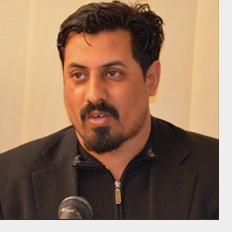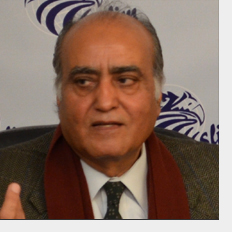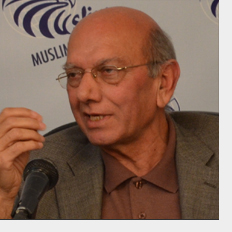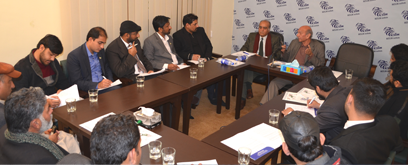 |
February 04, 2013 |
|
|
|
|
 |
Round Table Discussion on
“What Should Be The Role Of International Community In Peaceful Settlement Of Kashmir?”
|
| MUSLIM Institute, a research based think tank, organized a round table discussion regarding the Kashmir issue titled “What should be the role of international community in peaceful settlement of Kashmir?” on 4th February 2013 in Islamabad. Senior Kashmiri politician Sardar Khalid Ibrahim and Ambassador Khalid Mehmood were guest speakers on the occasion. Research associates of the MUSLIM Institute as well as from other think-tanks participated in the same. |
|
|
|

Tahir Mehmood, Program coordinator MUSLIM Institute, during the discussion, said that when the decision of ending the British rule in sub-Continent was made, there were two dominant competing political philosophies struggling for independence in the sub-Continent. One Muhammad Ali Jinnah's philosophy i.e. Islamic Ideology (La Ilaha IllAllah) and second the Hindu ideology of Jawaharlal Nehru.
The British, in the end, choose to partition the subcontinent into two states according to the demographics of each province. All areas which were predominantly Muslim in population would join to form Pakistan while the non-Muslim areas would constitute India.
With the British departure heads of princely states were given choice to accede to either of the state or, in theory, to remain independent. For most Princely States, it was a foregone conclusion that they would join Pakistan or India, whichever their population dictated. Otherwise, they would have been surrounded by territory of the opposite state. In Jammu and Kashmir, however, this choice was not simple or straightforward: the Maharaja was a Hindu who ruled over a predominantly Muslim population. Due to Kashmir's strategic location, it was feasible to join either state or even to become independent.
Tahir Mehmood further stated that according to Alastair Lamb, it seems likely that Lord Mountbatten, the British Viceroy, engineered partition in such a way that Jammu and Kashmir would go to India. At the very least, it seems evident that he tampered with the process sufficiently to leave that option wide open in the favor of India. By allocating Gurdaspur district of the Punjab to India, even though it ought to have gone to Pakistan by the logic of partition, the possibility of Jammu and Kashmir joining India was created forcefully. Had Gurdaspur gone to Pakistan, there would have been no land-route connecting India to Kashmir. The evidence seems to suggest that Mountbatten meddled with the proceedings of the Radcliffe Commission, whose job was to assign territories to either Pakistan or India. At best, his intention was to give Maharaja Hari Singh a real choice of which dominion to join. More likely is the assertion that he intended India rather than Pakistan to be the guardian of the Northern Frontier against the will of Muslim majority population because he had more trust in India's Hindu leadership.
Tahir Mehmood said that MUSLIM Institute urges international community to implement the resolutions of United Nations to provide right of self-determination to the people of Kashmir.
|
|

Khalid Mehmood, former Ambassador said that the Indian forces, reportedly, committed genocide by killing thousands of Kashmiris. Thousands of Kashmiri women have been raped or injured by them. Widows in Kashmir are in thousands, while children have suffered the most. By repeating the mantra of ‘cross-border terrorism’, India has tried to blame Pakistan for its crimes in Kashmir. Mass graves of over 2,000 people have been discovered in Kashmir. Yet, the flame of freedom cannot be extinguished, since the Kashmiris don’t want to be a part of India.
The question, however, is: how can the Indian government commit such excesses and still claim Kashmir to be its atoot ang? Even worse, how can Pakistan forsake the support to Kashmiris for the sake of keeping New Delhi in good humour?
He said that how a country like India can be the member of the Security Council if the India itself is not abiding by the resolutions of the same body. He further said that terrorism and genuine freedom movements should not be considered and treated similarly. He said that there should be Kashmir Cell in the Pakistani embassies abroad to keep the issue alive especially the human rights violations in Kashmir.
He further said that according to the logic of partition and relevant precedent, Jammu and Kashmir ought to have gone to Pakistan. No Princely State, when all was said and done, remained independent, though a few tried. If we take it for granted, then, that Kashmir could not have become an independent state, it still seems that Pakistan has the better claim to the territory. The population of the state was overwhelmingly Muslim; economic, geographic, and cultural ties seemed to point towards union with Pakistan. Pakistan’s stance on Kashmir should be strong and there should be no flexibility on this issue.
|
|

Sardar Khalid Ibrahim, Senior Politician Azad Jammu & Kashmir on the occasion said that the main cause for anti-India sentiments amongst Kashmiris is the record of human rights violations and atrocities committed by Indian forces in the Valley. According to a report by the Associated Press in 2001, the conflict has claimed an estimated 60,000-80,000 civilian lives. The Irish Times put the number of fatalities at more than 65, 000 in a December 2010 article, which also highlighted the issue of the thousands of people forcibly disappeared in Kashmir, an estimated 8,000 to 10,000 since the conflict began in 1989. A protest to demand official investigation into these cases is held on the 10th day of every month in Srinagar by the Association of Parents of Disappeared Persons.
After the 1948 ceasefire, the UN demanded a plebiscite for the Kashmiri people to decide which country they would join. This was never conducted and India and Pakistan remain in conflict over the issue to this day. Indeed, majority of Kashmiris feel unjustly occupied by India and denied their affirmed right to choose.
He said that there is an unfortunate trend in the international media of associating the current unrest with militancy or influence from Pakistan. The reality is that the current resistance and pro-freedom campaign is predominantly a civilian and indigenous movement. It is not militants or terrorists but hundreds of ordinary Kashmiris, from all classes and backgrounds, men, women and children who are taking to the streets to make a democratic stance and to raise their voices against an unjust regime. 'Go India, Go' is inscribed on the walls of buildings as well as roads and streets throughout Srinagar. Children as young as four stand beside their parents in the streets calling for freedom.
He further said that we, as Kashmiri people, want to be the part of Pakistan. Table talk between India and Pakistan should be on equal basis.
|
|
 |
| In the end participants of the round table discussion asked different questions to the speakers regarding history of the Kashmir conflict, various developments regarding the issue as well as approaches/strategies that could be adopted for peaceful settlement of the Kashmir issue. |
|
|
 |
|
|
|
| MUSLIM Institute? |
| MUSLIM Institute is a research institute dedicated to promote peace and stability in the Muslim world. Institute takes a multi-disciplinary approach focused on strategic stability through strong, pragmatic and principled social security, leadership and defence policies that endorses concord. |
|
 |
|
 |
|
|
|
|
|
|
